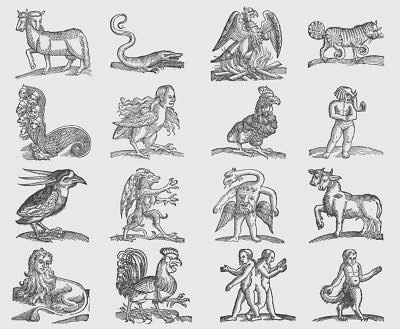Monster
 Do you ever have dark thoughts? Do you ever imagine awful things happening? Particularly when you wake up at two in the morning with such thoughts and can’t get back to sleep?
Do you ever have dark thoughts? Do you ever imagine awful things happening? Particularly when you wake up at two in the morning with such thoughts and can’t get back to sleep?The word monster has its origins in the Proto-Indo-European (PIE) root men (to think) and PIE moneie (to make one think of, to remind). These terms are the source of Latin monere (to remind, to bring to one’s recollection) and monstrum (divine omen, especially one indicating misfortune; portent, sign; abnormal shape; monster, monstrosity).
In the early 14th century the word monstre (malformed animal or human, creature afflicted with a birth defect) came to English from Old French monstre (monster, monstrosity) and Latin monstrum, eventually evolving to the word monster.
At that time, abnormal animals were regarded as signs or omens of impending evil. By the late 14th century we see diagrams of animals embodying parts of various creatures; e.g., centaurs or griffins (or mermaids or unicorns!). Today we might say that such signs are products of an unruly or overworked or fantastic (i.e., from fantasy) imagination.
In the 1520s, the word monster was used to describe an animal of enormous size. In the 1550s, monster was used to describe with horror people who exhibited cruelty or some other moral deformity. By the 19th century, monster was used to describe something of unusual size—today we have ‘monster’ truck derbys!
In brief, monsters would first of all seem to be products of our thoughts (today, we do not think of people with birth defects as monsters). However, this is not to say that there are still not real monsters of various types out there in the world.
You may be happy to know that PIE men (to think) is not just about thinking of monsters and other dark thoughts. Several other words come from this root, including admonish, amnesia, amnesty, comment, dement, demonstrate, idiomatic, mania, mental, mention, mentor, mind, mnemonic, money, monitor, monument, mosaic, muse, museum, music, muster, premonition, reminiscence, summon, and others.
Reference: Online Etymological Dictionary, https://www.etymonline.com/
Published on October 18, 2020 12:06
No comments have been added yet.



